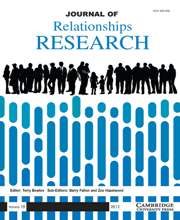Crossref Citations
This article has been cited by the following publications. This list is generated based on data provided by
Crossref.
Pizzano, Patricia A.
Sherblom, John C.
and
Umphrey, Laura R.
2013.
Being Secure Means Being Willing to Say You're Sorry: Attachment Style and the Communication of Relational Dissatisfaction and Disengagement.
Journal of Relationships Research,
Vol. 4,
Issue. ,
Ramsey, Meagan A.
and
Gentzler, Amy L.
2015.
An upward spiral: Bidirectional associations between positive affect and positive aspects of close relationships across the life span.
Developmental Review,
Vol. 36,
Issue. ,
p.
58.
Amichai-Hamburger, Yair
and
Etgar, Shir
2016.
Intimacy and Smartphone Multitasking—A New Oxymoron?.
Psychological Reports,
Vol. 119,
Issue. 3,
p.
826.
Robertson, Sharon
Davies, Matthew
and
Winefield, Helen
2017.
Positive psychological correlates of successful weight maintenance in Australia.
Clinical Psychologist,
Vol. 21,
Issue. 3,
p.
236.
Ogolsky, Brian G.
Monk, J. Kale
Rice, TeKisha M.
Theisen, Jaclyn C.
and
Maniotes, Christopher R.
2017.
Relationship Maintenance: A Review of Research on Romantic Relationships.
Journal of Family Theory & Review,
Vol. 9,
Issue. 3,
p.
275.
Zhang, Lijuan
Zhang, Shupeng
Yang, Ying
and
Li, Caina
2017.
Attachment orientations and dispositional gratitude: The mediating roles of perceived social support and self-esteem.
Personality and Individual Differences,
Vol. 114,
Issue. ,
p.
193.
Hingorani, Simran
and
Pinkus, Rebecca T.
2019.
The Ex-Factor: Attachment Anxiety and Social Comparisons Across Romantic Relationships.
Journal of Relationships Research,
Vol. 10,
Issue. ,
Kwok, Sylvia Y.C.L.
Gu, Minmin
and
Cheung, Andy
2019.
A longitudinal study on the relationship among childhood emotional abuse, gratitude, and suicidal ideation of Chinese adolescents.
Child Abuse & Neglect,
Vol. 94,
Issue. ,
p.
104031.
Leong, Joyce L. T.
Chen, Sylvia Xiaohua
Fung, Helene H. L.
Bond, Michael Harris
Siu, Nicolson Y. F.
and
Zhu, Jay Yijie
2020.
Is Gratitude Always Beneficial to Interpersonal Relationships? The Interplay of Grateful Disposition, Grateful Mood, and Grateful Expression Among Married Couples.
Personality and Social Psychology Bulletin,
Vol. 46,
Issue. 1,
p.
64.
Deichert, Nathan T.
Fekete, Erin M.
and
Craven, Michael
2021.
Gratitude enhances the beneficial effects of social support on psychological well-being.
The Journal of Positive Psychology,
Vol. 16,
Issue. 2,
p.
168.
Liu, Chyong-Ru
Kuo, Tonny Menglun
Wang, Yao-Chin
Shen, Ya-Ju
Chen, Shan-Pei
and
Hong, Jia-Wen
2022.
Perceived luxurious values and pay a price premium for Michelin-starred restaurants: A sequential mediation model with self-expansion and customer gratitude.
International Journal of Hospitality Management,
Vol. 103,
Issue. ,
p.
103185.
Evans, Nicholas D.
Juhl, Jacob
Hepper, Erica G.
Wildschut, Tim
Sedikides, Constantine
and
Fetterman, Adam K.
2022.
Romantic nostalgia as a resource for healthy relationships.
Journal of Social and Personal Relationships,
Vol. 39,
Issue. 7,
p.
2181.
Tadros, Eman
Gomez, Eunice
and
Dudek, Meghan
2022.
Couple Connectedness in the Time of COVID-19.
The Family Journal,
Vol. 30,
Issue. 4,
p.
589.
Hartanto, Andree
Kaur, Manmeet
Kasturiratna, K. T. A. Sandeeshwara
Quek, Frosch Y. X.
and
Majeed, Nadyanna M.
2023.
A critical examination of the effectiveness of gratitude intervention on well-Being Outcomes: A within-person experimental daily diary approach.
The Journal of Positive Psychology,
Vol. 18,
Issue. 6,
p.
942.
Fey, McKenna D.
Wood, Nathan D.
and
Ross, D. Bruce
2023.
Exploring the Unique Associations of Parent–Adult Child Relationships and Ongoing Parental Romantic Relationships with Adult Children’s Romantic Relationships.
The American Journal of Family Therapy,
Vol. 51,
Issue. 1,
p.
76.
Tashcheva, A. I.
Valeeva, G. V.
Gridneva, S. V.
and
Arpentieva, M. R.
2023.
Current issues of psychological support of education.
Professional education in the modern world,
Vol. 12,
Issue. 4,
p.
779.
Roth, Michelle
Good, Nicolas
Ledermann, Thomas
Landolt, Selina A.
Weitkamp, Katharina
and
Bodenmann, Guy
2024.
Building happier bonds: gratitude as a mediator between dyadic coping and relationship satisfaction in romantic couples.
Frontiers in Psychology,
Vol. 15,
Issue. ,


